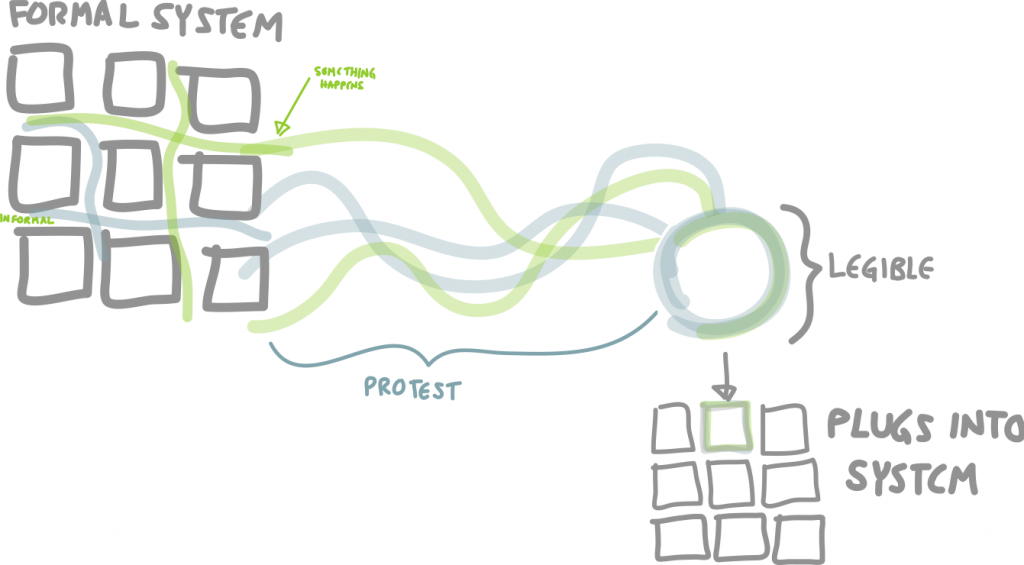Feeding off the Pixels and Paintbrushes blog entry. Interested in that transition space between the analog and the digital. It’s funny, liminal has long been my favorite word, rivaled only recently by penumbral. More and more, I get to look at and live in that space. But now I see it more as the space of transition, not just as space between/at the edge.
So this thing happens, where we have formal structures, and the informal takes up the space between. As in the previous entry, each of these has its purpose and strengths and weaknesses.
As a reference, let’s take the limited work I’ve done with Occupy Relief efforts. I act as human API – if you need something from a formalized organization, including them getting out of the way, let me know. Then there are posts like this one, which is totally legit. But it puts me in a strange place of saying “I stand with you politically, but if you want this taken care of logistically, then let’s do that.” Something that keeps me in the relief space is how stark a relief differences are thrown into1. The choices that have to be made, and what is considered important when, and what cultural artifacts are created by those choices. A big part of how adaptable and powerful Occupy is, is based upon their NOT being defined nor legible. More and more I wonder how to make groups like FEMA legible to Occupy, rather than the other way round.
Reading Seeing Like A State, if you can’t tell. So very good. And then, I got to see Douglas Rushkoff speak about his new book, Present Shock. I think a HUGE part of these ideas overlap.
He equated the quest for the upper right quadrant in Capitalism with the Singularity as an example of existing world views being applied to new ways of considering the future. Rushkoff also brought up the feminist media theory of storylines and plots of male vs female orgasm – one is a single escalation and then easy bell curve down. The other being complex, multi-apex, etc. The only way we’ve known for things to be predictable is with the storyline we could track – the male orgasm model2.
Now we have the ability to see, track, understand the complexity of “actual” life3 through big data4 in a way that understands as it emerges, rather than forces adherence to a predictable, and thereby incomplete, model. And instead we are applying the same two-dimensional, simplistic pattern to it, and cutting off the long tails of a bell curve we’ve forced everything into. We’re bringing the legal system of documents and MAYBE spreadsheets to a database and RDF world5. We are not allowing ourselves the nuance of the paintbrush, digitized through the use of high-density pixels. We’re making ourselves bland and bucketed instead. A low-res snapshot of culture, of which the mere act of capturing makes us fulfill it more closely. Through quantified self and things like Prism, we’re stealing our own souls, at least as things are set up now6.
And this is why I’m doing the research I am. I’m tired of us lugging our unexamined baggage into the future we’re building. In the past, institutions were where knowledge was stored. Now it’s stored in us, in a sharable and duplicatable way. Seeing Rushkoff was inspiring, because he noted that yes, it’s difficult to exist in the crevices, but it’s also totally worthwhile. Video and audio are up already on the Berkman site.
do you fit the mean? good for you. are you an anomaly, outlier? well, god help you, because the database will remove reason and compassion.
— Mike Estee (@mikeestee) March 10, 2013
It’s the trying to fit new things into old methods. We have to be willing to embrace some unpredictability in order for the lives of others to be more predictable to themselves. Crowds becoming “less predictable” to an outside view, but they’re becoming more self-determining. Let go of the reins and let it guide itself. Isn’t that the point of having power? To push it outwards?
—–
1. See why penumbral is a favorite word?
2. Sidenote that I just tried to find links to the academic background on this, but guess how useful the internet is for THAT.
3. Or at least a closer approximation than we’ve had in the past.
4. Which would be the crowning, and crowing, triumph of Sociology.
5. And the database model isn’t The Best, it’s just “better” than what we’ve had before, in that it’s more self-defining and adaptable.
6. Damn kids get off my keyboard.


Blog entry about illegibility, the quest for the upper right quadrant, and orgasm-based media theory : http://t.co/JmR0SjpR7A
Becoming Structured | willowbl00 http://t.co/w88G5OdJOF
Re. Liminal/borders – this ties in strongly with the (admittedly obscure) Taoist offshoot ‘Shen’ (Ch’an) or Three-Aspect Tao, which holds that Shen is the meniscus between Yin and Yang, the state (heh) and process by which each of those becomes the other. It also has some overlap with Fuzzy Logic, Brane theory and other non-dualistic thought systems & models. As the late lamented Robert Anton Wilson tells it, Shen was forced from China as it was considered even more heretical and anti-state than regular Taoist thought – its adherents ended up in Japan, where Shen was transliterated into ‘Zen’.
The application of this to statist hierarchical models is something I’ve been fiddling with for decades…
RT @willowbl00: Blog entry about illegibility, the quest for the upper right quadrant & orgasm-based media theory : http://t.co/nNB0ieEB4S
Re. Liminal/borders – this ties in strongly with the (admittedly obscure) Taoist offshoot ‘Sh… http://t.co/fNnDIevey5
RT @willowbl00: Blog entry about illegibility, the quest for the upper right quadrant, and orgasm-based media theory : http://t.co/JmR0SjpR…